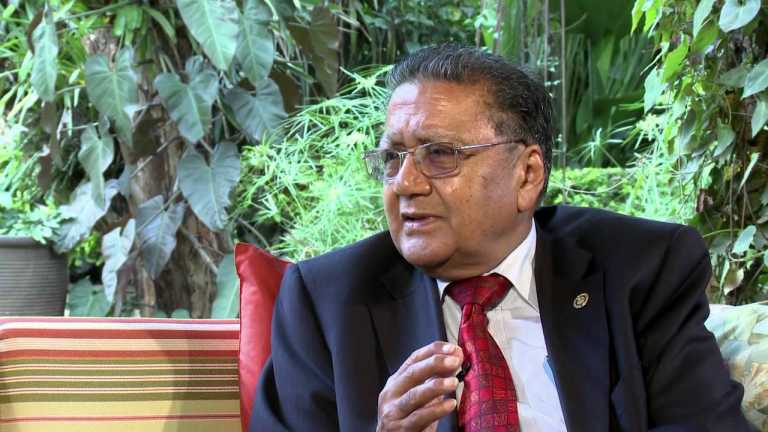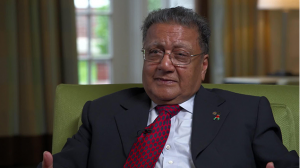
MANU CHANDARIA PROFILE
OVERVIEW
Manilal Premchand Chandaria (OBE EBS Elder of the Burning Spear) is a Kenyan businessman of Indian descent born in Nairobi. Besides being the chairman and CEO of the Comcraft Group of Companies which is a billion dollar enterprise “valued at $2.5 billion” that has its roots spread in over 40 countries, he is on the panels of several successful East African companies. He has won several awards in East Africa and Globally in acknowledgement of his entrepreneurial accomplishments and is also a noted sponsor. In 2003, Chandaria was awarded the Order of the British Empire (OBE) by Queen Elizabeth II. In December of the same year, he was awarded the Elder of the Burning Spear by former president Mwai Kibaki, which is one of the highest civilian awards in Kenya. He has been addressed as “one of Kenya’s leading industrialists”.
Background
Name: Manu Chandaria
Date of Birth: 1 March 1929.
Place of Birth: Nairobi
Schools: Chandaria attended several schools in both Mombasa and Nairobi before proceeding for his undergraduate studies in India.
University: Jamnagar India University (1949), University of Oklahoma (1949-1951)
Professional Courses:
- BA Science
- BA engineering
- Masters of engineering
Family:
Chandaria is wedded to Aruna with whom he has two children: their son Neal and daughter Priti, they both work in the family business. They have three grandchildren. He lives in Muthaiga with his family.
Career:
Despite Chandaria and his siblings being very literate individuals, they were torn between two ideas upon his return to Kenya. They were of two minds of either starting their own businesses or to join their family business. Upon consindering their parents who had sacrificed to educate them, they decided to venture into their family business. By then, his family used to run two businesses in Nairobi. One was providing wholesale services to several shops in the country while the other business was the Kaluworks Company in Mombasa. Shortly before Chandaria and his brother’s return to Kenya, their family had combined substantial holdings that made it possible for their entry into the profitable steel and aluminium industry. Chandaria’s father-in-law had organised a group of ten individuals to start saucepan manufacturing and other utensils in Kenya using Aluminium, this initiative originated from an Indian merchant in 1929, although this group finally broke up to pursue different ventures some twenty years later. These were the promising beginnings of the future $2.5 billion Comcraft Group. With its onset in the 1950s and 60s came the expansion of Comcraft to other countries such as Nigeria, Ethiopia, Congo, Zambia and India elsewhere with Chandaria being trusted with business dealings in Uganda, and Congo. He is today the chairman of Comcraft Group, Bank of India Advisory Committee in Nairobi among others. His private business interests are extensive and span the wide range of the Kenyan economy and as well as 50 other countries. In a current interview for the Creating Emerging Markets project at the Harvard Business School, he defends the notion that businesses should look at profit as the means, and not the end.
Milestones
- 1965: Establishment of other Kaluworks branches in Tanzania, Uganda, Burundi, Zambia and Ethiopia
- 1958: Expansion of Kaluworks Company from 40 employees to 800 employees
- 1956: The Chandaria foundation
- 1950-1960: Onset and expansion of the comcraft group of companies.
Key Positions
- Chancellor Technical University of Kenya and Unites States International University (USIU)
- Chairman and CEO of the Comcraft Group of Companies.
- Chairman Mabati rolling mills.
- Chaiman Kaluworks limited.
- Chairman Bank of India Advisory Committee in Nairobi.
- Founding chairman of the Kenya private sector alliance (KEPSA).
- Chairman Rotary club of Nairobi.
- Founding chairman of the East African Business Council (EABC).
Awards:
- Global peace Award in recognition of his charitable work in Kenya
- Elder of the burning spear by President Mwai Kibaki.
- the Order of the British Empire by Queen Elizabeth II
Early Life
Chandaria’s father who was an Indian merchant from Saurashtra in Gujarat, moved to Kenya in early 1915 and started a provisions shop along Biashara street in Nairobi after earning 160 rupees from working in another shop for six months., Chandaria grew up in the Ngara area of Nairobi in where they lived with three other families in the same house, as a small boy he assisted his father in the shop. Chandaria acknowledges that while he wasn’t born with a silver spoon in his mouth, at least there were spoons in their house. This is enough evidence of his humble beginnings. However, his father who was only three standards literate in the local languages was determined on giving the enthusiastic Chandaria the best education available since he had noted that in order to break even in life one needed to have an education. Chandaria attended various schools in Nairobi and Mombasa in Kenya from where he proceeded to India for his undergraduate studies. He graduated from Jamnagar India University, Bombay in 1949 with a Bachelor of Science from whence he proceeded to Oklahoma in the US. He graduated in 1950 with a bachelor in engineering and continued with his masters, which he obtained in 1951 from the University of Oklahoma. It was from here he returned to Kenya to find a prospering family enterprise and thus a platform where he would apply his swift business acumen to wrest a multinational company from the provisional shop that had once been.
Investments
- Undisclosed stake in Mobius motors Kenya
- Comcraft group of companies
- Mabati rolling mills
- Kaluworks limited
- Galsheets kenya limited
- Booth manufacturing Africa limited
- Elsons plastics of kenya
Role Models
- John D. Rockefeller
- Henry Ford
According to Manu Chandaria, these two individuals are his inspirations towards his charitable steak due to their contributions in helping the community and the Rockefeller Foundation and Ford Foundation respectively.
Philanthropy
Chandaria is a committed humanitarian, and in contentment to the principles of Charity, he and his family set up the Chandaria Foundation to further this belief. As Comcraft operates in more than 11 African countries, the Chandaria family has set up charitable trusts in each country to help in their humanitarian activities. Being the chairman of the Chandaria Foundation he is at the frontline of the charitable work of the family. He is the sponsor of numerous schools and clincs in Kenya and has been involved with more than 25 organisations. Chandaria sees John D. Rockefeller and Henry Ford as his inspiration behind his charitable streak due to their founding of the Rockefeller Foundation and Ford Foundation respectively. He has funded the Chandaria School of business in USIU and Chandaria business innovation and incubation centre in Kenyatta University. Chandaria also aims at building chandaria schools in all slums in Kenya. he states that all he belongs here and that all he has is from this country that is why he feels obliged to help in all the aspects he is capable of. He rebukes the many billionaires in Kenya who feel unsafe and fail to help the society as if they will lose by doing so. He further states that when one dies they don’t take anything and that the secret behind the Asian society success is holding each other’s hand
Peace Maker
Chandaria is ot only a member of the Global Leadership Council but also the patron and chairman of the Global Peace Foundation in Africa. He has spoken in all Global Peace Festival Conventions since 2010 and played a very critical role in Kenya’s hosting of the Global Peace Convention 2010 which was patronised and officially opened by the 3rd President of the Republic of Kenya Hon. Mwai Kibaki. In 2013, the Global Peace Foundation in Kenya under his chairmanship was nominated for the UN Person of the Year Award for its role in empowering the youth through entrepreneurship and a culture of service. On 7 December 2013, Dr. Chandaria addressed the Global Peace Convention 2013 held at the Shangrilla Hotel in Kuala Lumpur together with Dr. Hyun Jin Moon who attributed religious fanatics to the inter-faith conflicts.
Top tips for business success
- Do good to the community.
- Master your market.
- Business profits should be viewed as the means not the end.
- Zero multiplied by zero is zero.
- Passion and clear vision is critical in success.
Television Interviews links
- https://www.youtube.com/watch?v=76gY__htcvI
- https://www.youtube.com/watch?v=DTUdQ-3q1pE
- https://www.youtube.com/watch?v=_GBy7W3wkg4
- https://www.youtube.com/watch?v=4CuLQtwj-Ik
- https://www.youtube.com/watch?v=4CuLQtwj-Ik
- https://www.youtube.com/watch?v=sA0ASUhLTcE
Sources/ references
https://en.wikipedia.org/wiki/Manu_Chandaria
http://www.hbs.edu/businesshistory/emerging-markets/pages/profile-detail.aspx?profile=mchandaria
http://knowledge.wharton.upenn.edu/article/how-manu-chandaria-mastered-the-african-market/






